Quick Links 14
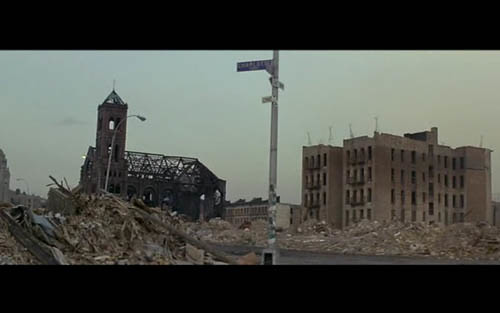 [Image: A film still from Wolfen].
[Image: A film still from Wolfen].
<1> Reduced to Rubble | Cartographies of the Absolute:
- There are a myriad of films that came out in the seventies and eighties that depicted, documented, exploited, and/or contributed to this dystopian image of a section of one of the world’s greatest cities reduced to rubble, not through aerial bombardment but so-called ‘benign neglect’ and ‘planned shrinkage’: Bonfire of the Vanities, Fort Apache, The Bronx, 80 Blocks from Tiffany’s, etc. Most of these, as well as a series of Hollywood films that use NY as a set for acts of shocking violence (one could add Death Wish, C.H.U.D., The Warriors, Escape from New York, Driller Killer, and innumerable others to the list) say little about what created the situations, usually implying that urban decline is a natural process and that the resulting depravity is the inevitable result of packing people together (especially non-white people).
One of the more ambitious and unusual films to fall under this rubric is the 1981 horror film Wolfen. An unusual mix of werewolf movie, police procedural, and serial killer thriller, Wolfen is based on a 1978 novel by Whitley Strieber, and directed by Michael Wadleigh, best known for directing the documentary Woodstock (1969). Entangled in a plot symptomatically torn between political history, capitalist practice and mythologies of the land, Wolfen is an odd and beguiling narrative about a critical moment in the collapse of radical politics and the emergence of a feral neoliberalism against a backdrop of urban dereliction and real estate speculation.
- More than a dozen people packing pistols on their hips strolled down the Hermosa Beach strand Saturday, picking up garbage and distributing fliers about the rights of gun owners.
The event was part of a burgeoning and controversial "open carry" movement nationwide promoting the right to carry guns in public. Although carrying a concealed weapon is illegal without a permit, California allows people to openly carry guns in many areas as long as they are unloaded, though they can keep ammunition with them.
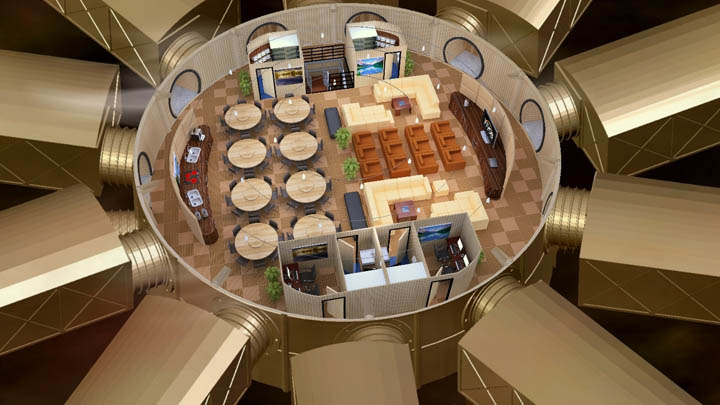 [Image: A 20,000 square-foot underground shelter by Vivos; courtesy of Vivos].
[Image: A 20,000 square-foot underground shelter by Vivos; courtesy of Vivos].
<3> An Investment in Life | USA Today:
- Jason Hodge, father of four children from Barstow, Calif., says he's "not paranoid" but he is concerned, and that's why he bought space in what might be labeled a doomsday shelter.
Hodge bought into the first of a proposed nationwide group of 20 fortified, underground shelters—the Vivos shelter network—that are intended to protect those inside for up to a year from catastrophes such as a nuclear attack, killer asteroids or tsunamis, according to the project's developers.
"It's an investment in life," says Hodge.
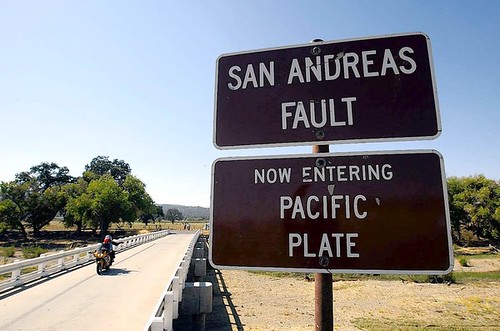 [Image: Photo by Spencer Weiner for the Los Angeles Times].
[Image: Photo by Spencer Weiner for the Los Angeles Times].
<4> The Mogi Doughnut | L.A. Times:
- Seismologists call the possible pattern a Mogi doughnut. It's the outgrowth of a concept, developed in Japan, which holds that earthquakes sometimes occur in a circular pattern over decades—building up to one very large quake in the doughnut hole.
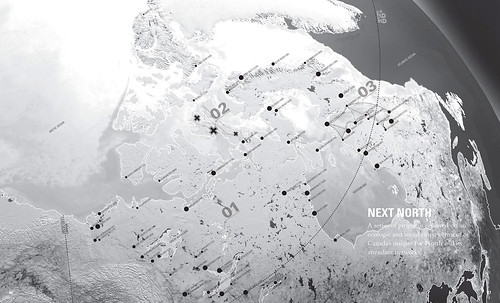

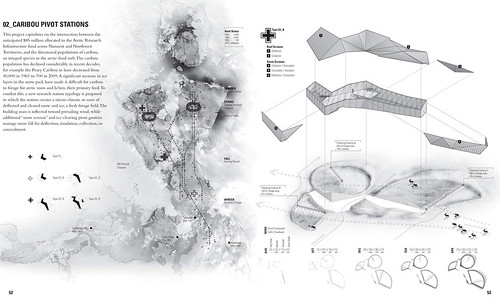
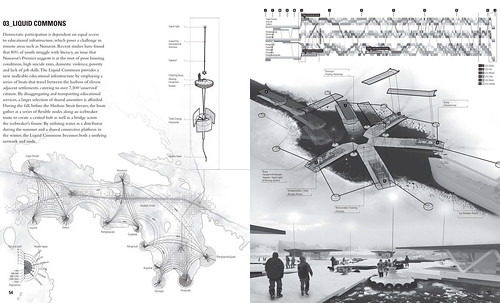 [Images: Emergent North by Lateral Office/InfraNet Lab].
[Images: Emergent North by Lateral Office/InfraNet Lab].
<5> Emergent North | Bustler:
- Emergent North looks at the challenges and opportunities of the public realm, civic space, landscape, and infrastructure emerging from a unique geography. Ms. Sheppard and Mr. White will conduct two travel routes through Nunavut, Yukon, and Northwest Territories, as well as Alaska and Greenland, to gather first-hand knowledge and documentation of Far Northern settlements.
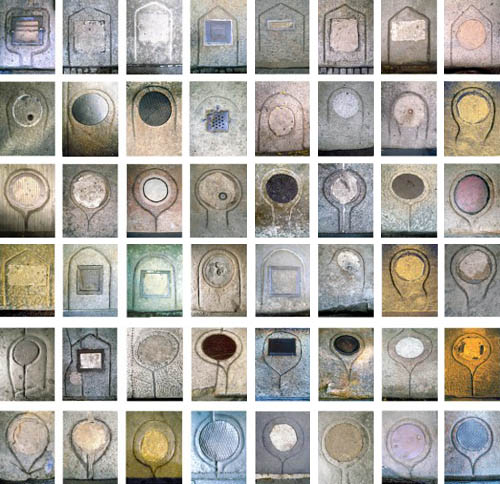 [Images: Photos by Linda Pollak, courtesy of Urban Omnibus].
[Images: Photos by Linda Pollak, courtesy of Urban Omnibus].
<6> City of Alternate Signs | Urban Omnibus:
- [Linda Pollak's] investigations into mysterious carvings in the granite sidewalks of Lower Manhattan have much to teach us about the ways natural forces determine urban form. They also have yielded photographic imagery that is visually arresting on its own. I happened to glance at one of these images in Linda’s office last winter, and immediately afterward I started seeing the “cuts and patches” they depict everywhere I went. Turns out many of them are coal chute covers, relics of a different era of energy infrastructure in formerly industrial neighborhoods like SoHo or TriBeCa.
- If you stand at the edge of the inner most ledge of the spiral and utter "Ah" you are supposed to hear "Ah" as if you spoke it into an echoing microphone.
 [Image: Institute of Oriental Studies, St. Petersburg/Giraudon/Art Resource, via Saudi Aramco World].
[Image: Institute of Oriental Studies, St. Petersburg/Giraudon/Art Resource, via Saudi Aramco World].
<8> Great Tent Cities in Muslim Lands | Saudi Aramco World:
- From the Middle Ages onward, European travelers... wrote admiringly of great tent cities in Muslim lands—especially in Central Asia, but also in Turkey, Egypt and later Mughal India. They were astonished at the size and organization of these cities that at times numbered thousands and even tens of thousands of tents.
The cities that amazed Europeans were not simply the black camel-hair ridge tents of the Arab world or the domed yurts of the nomadic Central Asian tribes. They included movable palaces, some complete with mosques, that housed traveling royalty and their vast entourages, or were set up to mark important celebrations, such as the marriage or circumcision of members of the ruling house. And it was not just the size of these tents that caught western eyes, but their splendor and comfort, and the way they served as showcases for wonderful textiles: cloth of gold, brocade, ikat, embroideries, velvet, chintz and appliqué.
- Jeremy Patterson moves large structures from place to place... Patterson's latest monster move involved a 19th-century brick mansion on a hill, which the owners wanted transported five miles south to their winery... Patterson and his crew dug out the foundations and cut holes in them at intervals, into which they slotted a lattice of 110-foot steel beams. Then they pumped the beams up on jacks, demolished the foundations, slid some wheels underneath and drove the whole thing away... He can't stop talking about what an insane idea moving a building is. He kept mentioning the threat of the house collapsing and killing everyone. A few minutes later he collapsed himself, of a suspected heart attack.
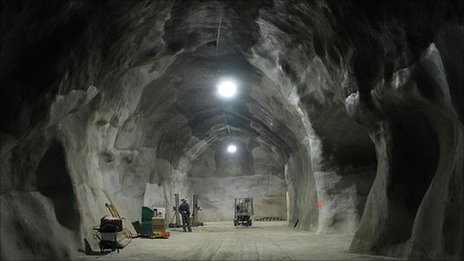
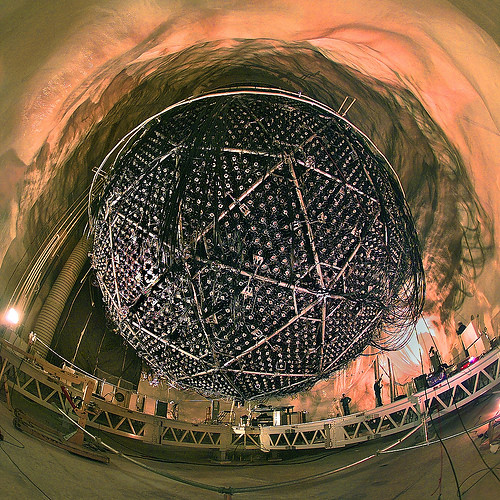 [Images: The SNOLAB neutrino detector and mine in Ontario, Canada].
[Images: The SNOLAB neutrino detector and mine in Ontario, Canada].
<10> The Light Below | BBC:
- Scientists are looking to relocate an underground experiment searching for dark matter to an even deeper site. Cosmic rays striking the Earth could completely mask the rare dark matter events sought by the experiment. Team members want to cut out as much of this cosmic ray interference as possible, even if it means moving the experiment 2km below ground. This could help them positively identify the particles thought to make up dark matter. Dr. Marek Kos, who is a team member on the Cryogenic Dark Matter Search II (CDMSII) project, outlined details at the International Conference on High Energy Physics (ICHEP) in Paris. He said the experiment could be relocated from a mine in Minnesota to a deeper facility in Ontario, Canada.





Comments are moderated.
If it's not spam, it will appear here shortly!
RE: "an investment in life"
from the vivos site:
"Vivos is in a race against time to complete construction and commissioning of a global network of underground community shelters prior to the predicted December 21, 2012 Mayan date."
Please keep in mind that no credible scientists have attributed significance to this date, it just happens to be the end of a long cycle in the Mayan calendar.
Vivos seems to be more of "an investment in fear" than anything else.
RE: other entries in the post
very interesting as usual!
Thanks for the shout-out!
In the spirit of the first link,
an article about a 3d film about post-war Warsaw, Poland.
http://news.yahoo.com/s/ap/eu_poland_world_war_ii_in3d
Great resource of information, as always, Geoff! Thanks for sharing.
Related with the 10th link:
http://dprbcn.wordpress.com/2010/04/17/icecube-attempting-to-catch-the-rare-neutrino-that-crashes-into-an-atom-of-ice/
I've been reading your post at the CCA about Raimund Abraham [UN] Built works, remarkable article too!
Thanks, Ethel! You can also read about the IceCube project here on BLDGBLOG.
The vein of the ruined city is indeed rich. An interesting investiagation's going on here:
http://www.spoilheap.com/smallfinds/2010/03/fragile-dreams-3/
this comment concerns only a blog you posted some time ago about your interview with Lebbeus Woods. My question is: Do you have a copy of his Einstein Tomb (Pamphlet Architecture #6)?
I know this is probably rather an odd request but I am sincere and if you would send me an email about this request I would be grateful.
Sincerely,
www.barrett8@usfamily.net
Anonymous, I only have Einstein Tomb from the Pamphlet Architecture 1-10 collection.
Hope you can find a copy!
Post a Comment